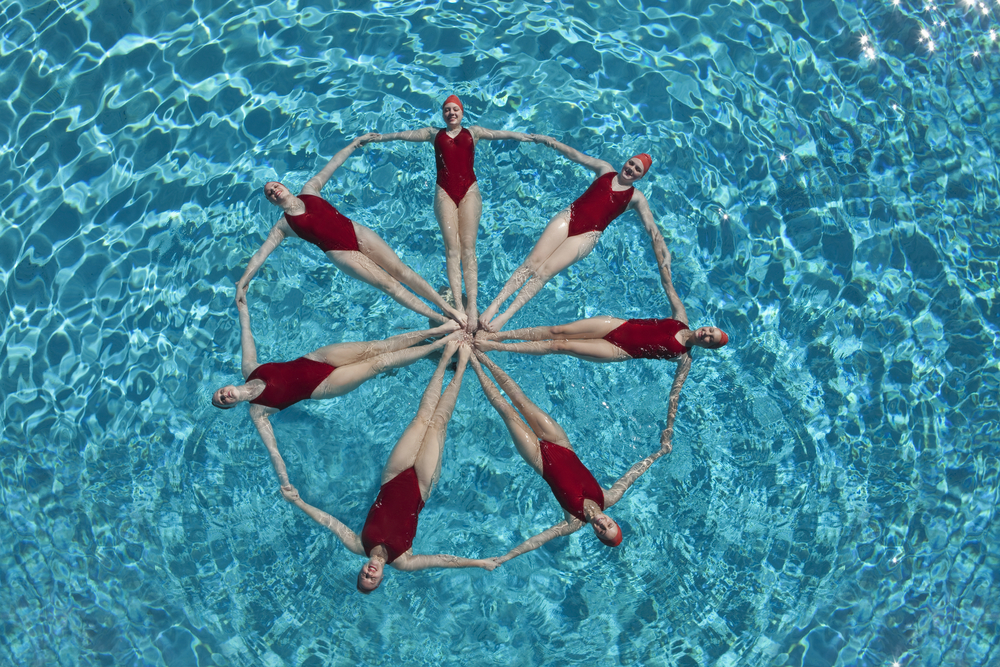I remember the night I fell in love with synchronized swimming. It was mid-summer and London 2012 had gripped the nation. I had just wobbled home from a drinking session of Olympic proportions, when I sprawled on the sofa, flicked on the TV and on came BBC’s rerun of the day’s action.
I don’t recall ever watching people dance in water before. Now I was witnessing eight of them acting as one unified organism. Perhaps it was the cubic-meter of beer I’d swilled earlier that evening, or maybe legs and Lycra will just do that to an 18-year-old, but I professed my undying devotion there and then.
The Olympics: An Unrequited Love
The reason I have let you in on that rather personal anecdote is to reinforce a point: the single greatest thing about the Olympic Games is that they allow you to become completely enamored by sports you otherwise don’t give a toss about.
Gymnastics has taken me especially this year. I love watching people contort their bodies in such a way that defies everything I was taught about physics – though I’d argue that’s an indictment on my physics teacher more than anything else. I’d also argue the Japanese team is the most equipped for such an endeavor.
Daiki Hashimoto is just 19, but he's already Japan's leading gymnast.
Appearing in his first Olympics, Hashimoto won the gold medal in the individual men’s all-around event. Here's how it happened. https://t.co/4KU33aw1yX pic.twitter.com/bLYDSWty4N
— The New York Times (@nytimes) July 29, 2021
Daiki Hashimoto, the 19-year-old who won gold in the men’s all-around event, looks like the offspring of a ninja and a boulder. His fifth-placed compatriot, Takeru Kitazono, looks like someone gave steroids to a baby.
The women’s gymnastics team final tossed up drama of its own. The majestic Russians, masquerading rather conspicuously as the Russian Olympic Committee, looked like they’d pirouetted straight out of a Tchaikovsky ballet and onto the top of the podium. But it was the US, or more precisely the case of Simone Biles, that caught the headlines.
Biles, arguably the greatest ever gymnast to walk the planet, pulled herself out of the team event after a dodgy performance on the vault, which she attributed to a mental block. Now perhaps I am becoming rather cynical, but why must everything turn into a competition of who can signal the most virtue on social media, followed by political polarization?
Here’s an example from the “progressive” website McSweeny’s. “Are you a gymnast?” it asks. “No, I’m a conservative pundit who has never done so much as a cartwheel in his life, let alone landed a Yurchenko double pike.” What a bizarre world we live in.
Suga Uses Funny Math at Tokyo 2020
Equally bizarre is Prime Minister Suga’s adamance that the arrival of the Games bears no relation to Tokyo’s record-breaking Covid-19 case numbers. We can’t prove cause-and-effect, but the correlation is certainly fishy, especially since there have been at least 200 Olympics-related Covid-19 cases since June.
The move, expected to be formally announced later Friday, comes after daily cases nationwide topped 10,000 for the first time on Thursday. https://t.co/BxSCUYCntH
— The Japan Times (@japantimes) July 30, 2021
That said, Suga’s pandemic rhetoric is like an inverted Occam’s razor: if a supposition seems logical, he takes quantum leaps in the opposite direction.
Personally, I am not all surprised by the viral surge. I have read some op-eds in the foreign press speaking of Tokyo’s empty streets amid the Olympics and I wonder if the writers are indeed inhabiting the same city I am. Tokyo is thriving in this long hot summer.
Consumers are everywhere, the izakaya remaining open are packed to the rafters and just look at how many people flocked to the Japan National Stadium – both in protest and in support – for the Olympics opening ceremony.
What’s in a Name?
On a brighter note, why can’t foreign commentators pronounce Japanese names? It’s a graciously phonetic language when it wants to be, yet the British commentary insisted on calling Daiki Hashimoto, “Taiyaki” Hashimoto; literally referring to the world’s top gymnast as a fish-shaped pastry.
The British lot weren’t the only ones making a hash of things. A US commentator said the following during the men’s table tennis semi-finals, “There are a lot of words in Chinese that don’t exist in English.” Well I never! I’ll be appropriating that pearl of wisdom as though it were my own. Thankfully, the match in question was far more entertaining than the unbidden linguistics lesson.
Even the Tokyo Olympics' stadium and TV announcers couldn't agree on whether Japan is "Nihon" or "Nippon." https://t.co/Bfht9lRIKx
— SoraNews24 (@RocketNews24En) July 27, 2021
The bout between top seed Fan Zhendong of China and Lin Yun Ju of “Chinese Taipei” was a dizzying battle embodying one of the world’s most fraught geopolitical rivalries. It can’t be easy playing against a guy who’s flying the flag of the same country that won’t let you represent your own (Taiwan) for fear the world might think it’s a sovereign nation.
And don’t tell me there wasn’t any symbolism in Zhendong eventually crushing his opponents resolve. Then again, just looking into some of the Chinese athletes’ steely eyes turns my own resolve into dust. And I’m protected by a TV screen and several miles of Tokyo turf.
Are the Olympics Stuck in a Sand Trap?
China currently tops the overall medals table with 15 golds and counting. Table tennis will surely bring in a few more, while China has maintained its traditional stranglehold on diving, save the 10-meter men’s synchro gold which went to Tom Daly and Matty Lee of Team GB. What a tit-for-tat encounter that was, watching the two pairs of Adonises fling themselves off a platform like stringless yo-yos. All for piece of gold.
As I write this, it feels like a “slower” morning at the Games – though that’s an entirely subjective notion. As such, I have been focusing on the golf and not a lot else. I love golf, but it has no place in the Olympics. If an Olympic gold is not the most prized accolade in your sport, the sport’s inclusion is redundant.
The commentators are playing it up to be a marquee competition. Several players in the world’s top 10 opting out, however, refutes that claim. The golfers were able to site Zika virus in 2016 and Covid in 2021 as reasons for their absence, but the wool isn’t being pulled over anyone’s eyes.
Anyway, that’s enough from me, I’m off to watch the archery.









